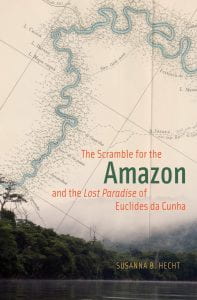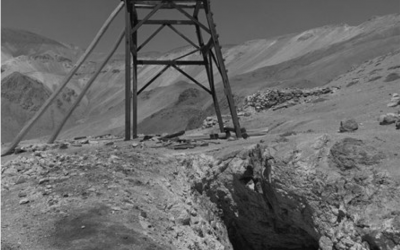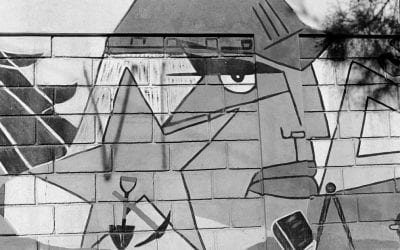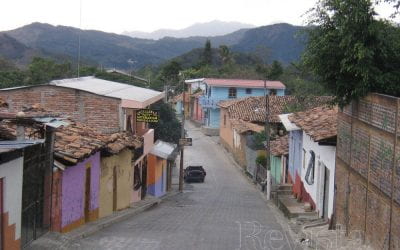A Review of The Scramble for the Amazon and the “Lost Paradise” of Euclides da Cunha
Meditations on the Brazilian Amazon

The Scramble for the Amazon and the “Lost Paradise” of Euclides da Cunha By Susanna B. Hecht University of Chicago Press, 2013, 612 pages
As its title suggests, Susanna B. Hecht’s The Scramble for the Amazon and the ‘Lost Paradise’ of Euclides da Cunha is actually two books in one. The first takes a macro approach, examining the geopolitics of imperialist competition in South America in the late 19th and early 20th centuries, while the second is very much a work of micro scholarship, focusing on the professional and private life of the Brazilian writer and military engineer Euclides da Cunha, a key player in the larger struggle. Both texts, however, share a common virtue: they supply valuable information about episodes not likely to be known to English-language readers.
Hecht’s credentials for this intimidating task are considerable. A geographer and professor of urban planning at UCLA who has traveled extensively in the Amazon herself, she is the co-author, with Alexander Coburn, of the 1990 book Fate of the Forest: Destroyers, Developers and Defenders of the Amazon, which has become an important text in environmental studies and cultural geography. Her new work is in some respects a companion to the earlier volume, a kind of prequel that explains how the Amazon came to be dominated by Brazil and how earlier resource booms, especially of rubber and gold, set the stage for the heedless get-rich-quick mentality that prevails in the region today.
The title of Hecht’s book plays off the much better-known and exhaustively studied European powers’ “Scramble for Africa,” which was taking place at the same time as the phenomenon she is writing about, involved a similar competition for control of natural resources and featured many of the same actors. Great Britain, the Netherlands and France all had colonial footholds at the northern edge of the Amazon, which they were eager to expand beyond the Guyanas, and King Leopold II of Belgium, having already seized control of the Congo, was always hovering, waiting for an opportunity to enter the fray.
But Hecht also notes that, in contrast to Africa, the Amazon version of the “great game” featured the United States as an important player with ambitions of its own. That Wall Street would want a presence once the rubber boom started is obvious, and well known. But in the years preceding the Civil War, and even afterwards, sympathizers of Southern slavery envisioned the establishment of American colonies in the Amazon, and took steps to make that happen. Thus it was, to cite just one example of Hecht’s ability to find the obscure but illuminating detail, that a “cohort of Confederates were responsible for naming the Ucayali port of Leticia, at the intersection of Peru, Colombia and Brazil,” which “was named after President John Tyler’s granddaughter, the first person to raise the Confederate flag.”
So how did the Amazon avoid being carved up, as Africa was, by colonial powers external to the region? In Hecht’s telling of the story, much of the credit goes to a figure who, though not named in her book’s title, gets as much attention as Euclides da Cunha: Jose Maria da Silva Paranhos, the Baron of Rio Branco, Brazil’s Foreign Minister at the height of the scramble and, as such, da Cunha’s patron and boss.
At the turn of the 20th century, da Cunha had become one of Brazil’s most celebrated writers with the publication of Os Sertoes, known in English as “Rebellion in the Backlands,” a study of a millenarian uprising by peasants in the country’s northeast. He envisioned writing another book, this one about the Amazon and to be called Lost Paradise, an undertaking that his patron, Rio Branco, realized could be effective in advancing Brazil’s interests.
A deft diplomat, Rio Branco used the Monroe Doctrine to enlist the United States, where he had served in the Brazilian legation and made many friends, as a partner in keeping the Europeans out of the Amazon. But when Washington looked ready, through a treaty with Bolivia, to make a grab for the rubber-rich territory of Acre in the heart of the Amazon, Rio Branco was able to use the relationships he had cultivated in the United States to thwart that effort.
The Acre episode is one of three major territorial disagreements that provide the narrative spine of Scramble for the Amazon, the others being the so-called “Contestado” strip just south of the Guyana colonies of the European powers and a dispute with Peru over control of the Western Amazon. In all three instances, Rio Branco proved triumphant through his manipulation of processes of adjudication and arbitration, and without Brazil having to resort to arms. As Hecht puts it, in his statecraft, “precedent was useful but not definitive: maps and documents were often inconclusive. The malleability of these processes was Rio Branco’s greatest insight and underpinned his phenomenal success.”
Hecht’s portrayal thus adds both detail and context to what is still the most thorough treatment of the father of Brazilian diplomacy, E. Bradford Burns’ 1966 The Unwritten Alliance: Rio Branco and Brazilian-American Relations. She notes, for example, that early in his career Rio Branco did a stint as Brazil’s consul general in Liverpool, “the hub of Britain’s imperial commerce,” where he quickly came to “appreciate the commercial significance of Amazonia, a reality that often escaped his Rio-based colleagues.” Later, as ambassador to Berlin, he was able to “witness the diplomacy of the great powers in the Scramble for Africa,” which provided “useful schooling for deciphering strategy in large-scale territorial disputes.”
Da Cunha became useful in both the practical and the theoretical realms to Rio Branco’s efforts to extend and protect the frontiers of Brazil. Thanks to da Cunha’s experience as a surveyor, he was a logical choice to be Brazil’s chief representative on the boundary commission set up with Peru to map the watershed of the Jurua and Purus Rivers, which both countries claimed. Much was at stake in that venture: as da Cunha himself wrote, this was “the largest territory that had ever been contested between two nations, some 720,000 square kilometers in one of the very least known parts of the planet.”
In the battle to mobilize Brazilian and international public opinion, da Cunha may have been just as helpful. In a series of essays and newspaper articles that laid the foundation for the book he would never write, he turned the prevailing racist ideology of his era on its head, arguing that those most fit to settle the Amazon were not colonists from Europe, but Brazil’s caboclos, the mixed-race offspring of Europeans, Amerindians and Africans. This was an argument that not only stoked Brazilian pride and nationalism, but enhanced interest in the remote Amazon among city-dwellers in the more sophisticated south of the country.
Da Cunha capped his service in the Amazon by preparing for international arbitrators an expedition report that, under the guise of neutral language, cleverly favored Brazil’s arguments for control of the Purus and Jurua. “Had Peru won the arbitrations it would have become an Amazonian superpower—a kind of Brazil,” Hecht writes. “Instead, Brazil with its documents, maps, essays and arguments, largely prepared by da Cunha, prevailed, giving us the map of the Amazon we know today.”
Structurally, Scramble for the Amazon is as much a hybrid as its two main subjects. Some chapters read like sections of a history textbook, though with a conspiratorial tone that Thomas Pynchon would approve of, while others are more like literary criticism, with the requisite references to Foucault. In some early chapters, knowledge of geology, botany and cartography is useful, while the final chapters seem almost like a telenovelascript, thanks to what Hecht calls “the air of gothic melodrama” that hangs over da Cunha’s final years, when he returned from the Amazon expedition to find that his wife had taken a lover, had a child by him, and would not end the affair with the military cadet half her age, who would eventually shoot and kill da Cunha before he could finish his book on the Lost Paradise.
This approach, though rather ungainly at times, seems justified because of the vastness of the topic Hecht is addressing and also because it mimics da Cunha’s own style. “I ended up writing more of a biographical essay than I intended,” Hecht confesses in one of the book’s final paragraphs. “Like da Cunha’s own Amazon fragments, this work is part biography, part social history, part nature writing, part geographic translation,” an “apparatus for connecting various fragments that, of course, are also meditations on place, race, history, Brazilian nationalism and human progress.”
Related Articles
Urban Mining
Consider two seemingly unrelated issues: rising urban poverty and electronic waste. The Cities Alliance estimates that urban slums in developing countries are growing by…
First Take: Two Tales of Mining and Human Choice
Two tales of very small human settlements with mining potential may help us reflect on what Latin America, on a larger scale, faces today regarding the exploitation of minerals from its territories. At these two settlements, mining was stopped because of human choices and…
Resistance to Mining in El Salvador
Will tiny El Salvador, where half the rural population lives on less than two dollars a day, become the first nation on the planet to legally ban gold mining? Or will profit-maximizing transnational mining companies succeed in using investor-friendly international…




